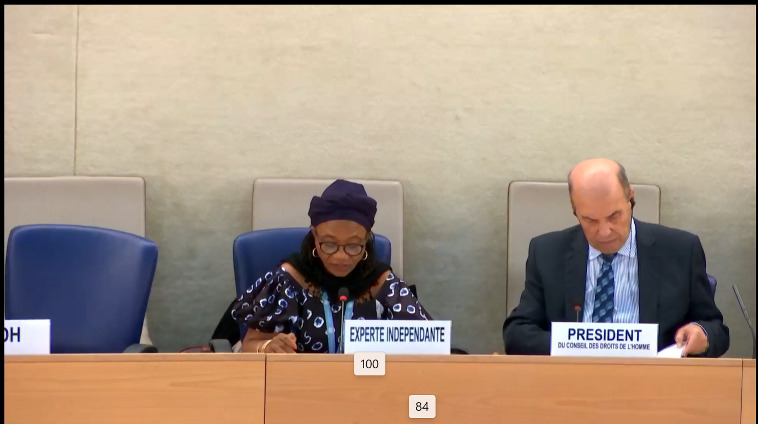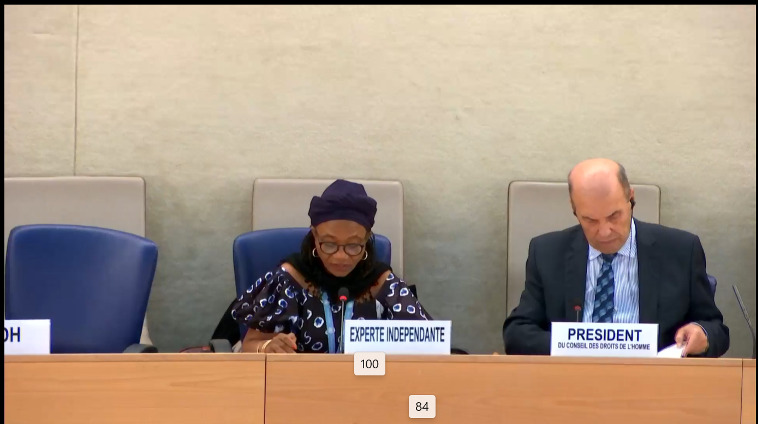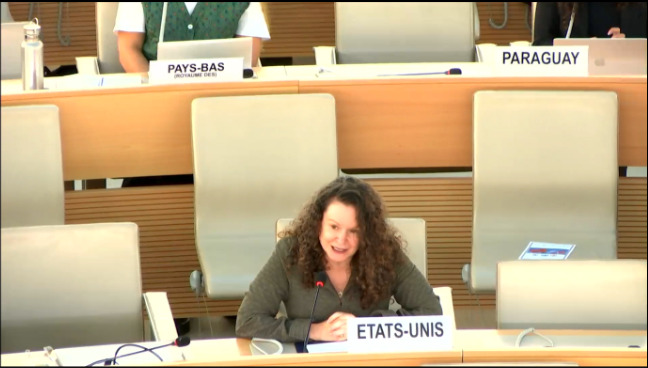The 57th Session of the Human Rights Council
9 September – 11 October 2024
Item 10: Technical Assistance and Capacity Building
Interactive Dialogue with the Independent Expert on the Situation of Human Rights in Somalia
7 October 2024

By Patricia Mutebi Jjuuko/GICJ
Executive Summary
On 7 October 2024, the 41st meeting of the 57th session of the Human Rights Council considered the report of the Independent Expert on the situation of Somalia (A/HRC/57/80) during an interactive dialogue. In her report, the Independent Expert Isha Dyfan provides an update on the progress achieved by the Federal Government of Somalia in the implementation of the seven benchmarks set out in her previous reports, to be met amidst political, security and human rights developments and humanitarian situations in Somalia.
The country representative of Somalia, Mr Salah Moallim Abubakar, reported his country’s dedication to enhancing the human rights situation in Somalia, which is evident not only through the legislative and institutional reform agenda but also in their collective effort to bolster collaboration and coordination with the UN human rights mechanism.
In the ensuing discussion, states voiced concerns regarding the rights of women and girls and the persistence of sexual and gender-based violence in Somalia, including female genital mutilation. Member states deplored restrictions placed on civic space, including independent media and journalists. Delegates called for the government of Somalia to take all necessary measures to strengthen its capacity to prevent and address sexual and gender-based violence and to ensure that survivors are protected and have access to justice and effective remedies.
Geneva International Centre for Justice (GICJ) expresses gratitude towards the Independent Expert for the comprehensive report and dedicated efforts. GICJ urges the Government of Somalia to prioritise peace, security, and reconciliation efforts to protect civilians. Additionally, we call on Somalia to strengthen women’s rights by ratifying the Convention on the Elimination of All Forms of Discrimination against Women (CEDAW) and the Protocol to the African Charter on Human and People’s Rights on the Rights of Women in Africa.
Background
The report presented to the Human Rights Council resolution 54/32 covers the period from 1 July 2023 to 30 June 2024. In this period, the Independent Expert on the situation of human rights in Somalia, Isha Dyfan, conducted two official visits to Somalia. The first visit occurred between 6 to 19 November 2023 and the second was from 5th to 11th May 2024.
Ms Dyfan held consultation meetings in Ethiopia and Uganda from 26th September to 6th October 2023 and in Nairobi, Kenya from 11th to 16th May 2024. These meetings were held with representatives of the United Nations, the African Union and the Intergovernmental Authority on Development (IGAD), members of the diplomatic corps, representatives of civil society, and academic institutions. In these meetings, she engaged with various stakeholders to assess the human rights situation in their countries along with, follow up on discussions regarding their Government’s achievements, and the challenges faced. Moreover, the Independent Expert engaged with Somali authorities on progress made on the benchmarks outlined in her previous report. The benchmarks and indicators for improving the human rights situation include: promoting security, peace and reconciliation for protection of civilians in conflict, strengthening the rule of law, accountability and transitional justice, ensuring respect for the freedoms of opinion and expression and of assembly and association, promoting women’s rights and gender equality in all aspects of society, ensuring respect for children’s rights and promoting youth empowerment, promoting economic, social and cultural rights and lastly protecting the rights of persons with disabilities, minorities and marginalised communities.
Report of the Independent Expert

In her report, Isha Dyfan, the Independent Expert on the situation of human rights in Somalia, declared that Somalia continues to show resilience in the face of persistent security and human rights challenges. Economic, social and cultural rights such as access to water, land, health and education continue to be a challenge in regards to women and children, internally displaced persons, persons with disabilities, people of minority clans and other vulnerable groups.
The Independent Expert highlighted that insecurity continues to be a major contributing factor to the deteriorating human rights situation. Civilians continue to bear the brunt of the conflict in Central and Southern Somalia as a result of Al-Shabaab attacks, as illustrated by the horrific attack at Lido Beach in Mogadishu that killed 37 civilians and injured over 200, including many young people. She further stressed that those responsible for these atrocities against the civilian population must be prosecuted.
Ms. Dyfan noted that all partners to the conflict, including international actors, continue to commit violations of international human rights and humanitarian law. Deadly inter-clan conflicts over access to natural resources and political power also continue to expose civilians to increasing violence and displacements. In her recent mission to Somalia and interactions with government officials, she expressed concern regarding the delay in the operationalisation of the national human rights commission; as well as the lack of priority placed on establishing a judiciary commission and anti-corruption commission, which have been pending for years.
The Independent Expert regrettably highlighted that despite the efforts made by the government to align the country's legislative framework with its international human rights obligations, some important legislations, including the juvenile justice bill, the child rights bill and the anti-female genital mutilation bill, are still pending at various stages. She urged the federal parliament to prioritise the adoption of the pending legislations to enhance protection of human rights in the country. On a positive note, there has been progress towards gender equality, she noted that women's participation in decision making in Somalia has received some attention in recent months. This is evident by the introduction, in the provisional constitution, of a new provision that ensures women's participation in legislative assemblies and political parties. However, the absence of provisions for a minimum 30% quota for women's representation remains a challenge.
Additionally,women continue to suffer the endemic problem of sexual andgender-based violence, in particular the deplorable occurrence of gang rapes combined with homicide. Ms. Dyfan reiterated her appeal to the government to adopt a systemic legal and judicial response to prioritize the seriousness of this situation. Likewise, reports of abduction and forced recruitment of children and youth by fighting forces, challenges related to education and vocational training coupled with unemployment and nonparticipation in public life, continues to hinder the full enjoyment of children and youth's rights. Ms. Dyfan welcomed the recent launch, September 2024, of the national action plan for children in Somalia as a positive step towards improving the situation for children.
Regarding the death penalty, the Independent Expert expressed concern over the increasing number of executions in recent months, sometimes as a result of judicial procedures that do not fulfil the most stringent guarantees of fair trial and due process, required under international human rights. She voiced worry over the information that death penalty has been carried out against minors and called on the federal government to consider establishing an official moratorium on all executions, as a first step towards fully abolishing the death penalty in Somalia.
Ms. Dyfan commended the people of Somalia for their resilience in the face of natural disasters and other challenges. Somalia has been a victim of a cycle of climate and natural disasters which have exacerbated vulnerabilities and increased the internally displaced population, now estimated to be 3,861,643, as of May 2024. She noted that the 2024 Somalia humanitarian needs and response plans require U.S. dollar 1.6 billion to assist 5.2 million people. Ms. Dyfan urged the international community to continue to support the humanitarian response plan and reinforce the resilience against future disasters.
In conclusion, Ms. Dyfan highlighted that Somalia is at a crossroads between pursuing peace and reconciliation through enhancing security, strengthening international relations and bridging the gaps in international and legislative agendas, to create a better environment for boosting economic growth. She welcomed the positive step that laid the foundation for the transition process to facilitate the implementation of Somalia's national and international human rights obligations and commitment. Ms. Dyfan emphasised not to lose sight of the reality on the ground that continues to have devastating effects on Somalia's population particularly the vulnerable groups.
Statement by Mr Salah Moallim Abubakar Representative of Somalia

Mr Abubakar acknowledged the existing challenges and gaps in the human rights situation in Somalia. He emphasised his country’s dedication to enhancing the human rights situation in Somalia which is evident not only through the legislative and institutional reform agenda but also in the collective effort to bolster collaboration and coordination with the UN human rights mechanism.
The representative stated that through various small programs, they have made significant changes in advancing various human rights, promoting inclusivity and empowering vulnerable communities throughout Somalia. The country remains engaged in international partnership to sustain achievements and develop new initiatives that are more impactful and result oriented.
Mr Abubakar reiterated his country’s commitment to implementing key legislations which are currently under the Parliament review and working with international partners, including of the UNHRC, for a one-year transition period to strengthen their national and human rights obligations and commitment.
Interactive Dialogue

In the ensuing interactive dialogue, the European Union urged the authorities to institutionalise training on international human rights and humanitarian law within the Somali national army, to prevent civilian harm during military operations. Additionally, the EU expressed concern about the recurrence of female genital mutilation practices and urged the government to take bold action to eliminate such practices; in addition to ratifying the convention of elimination of all forms of discrimination against women.

Subsequently, Belgium, on behalf of the Benelux countries, highlighted that given the volatile security situation, strong local institutions and accountable security structures are crucial in areas liberated from Al-Shabaab. The delegate pointed out concerning restrictions on civic space, including on independent media and journalists. In 2023, Somalia ranked among the top five countries with the most executions. The delegate was particularly alarmed by the execution of four young individuals in August, underage at the time of their offenses. He urged the government to respect its obligations under the CRC, which prohibits capital punishment of minors.

Estonia’s delegate, on behalf of the Nordic Baltic countries, recognised the progress made towards fulfilling Somalia's international human rights obligations, but remained concerned about ongoing violations and abuses of human rights and international humanitarian law, such as, reports of arbitrary arrests, detentions and extrajudicial executions.The delegate also shared extreme concern regarding the rights of women and girls in Somalia and the persistence of sexual and gender based violence including female genital mutilation. She called upon the government to take all necessary measures to strengthen its capacity to prevent and address sexual and gender based violence and to ensure that survivors are protected and have access to justice and effective remedies.

Qatar affirmed the need to respect the sovereignty, unity, independence and the territorial integrity of Somalia. The delegate called on the international community to continue providing humanitarian development support as well as technical assistance to help out Somalia, with regards to implementing human rights obligations in line, as its priority.

United States of America, expressed concern over the continued threats faced by journalists and others engaging in civic discourse; freedom of expression is a universal right. Governments that welcome open civic debate enhance their legitimacy and foster peace and stability. The delegate reiterated that Somalia's national reconciliation framework explicitly calls for the meaningful participation of women and youth in governance, peace building discussions and decision-making processes.

Egypt commended the efforts undertaken by the government of Somalia to align its policies with international obligations and the amendments to the first four chapters of the temporary 2012 constitution. The delegate requested that technical assistance must be provided to Somalia to overcome the challenges that hamper the promotion of human rights in the country.

Eritrea affirmed that technical assistance is essential in building institutional capacity by providing adequate resources and professional support to national institutions. The delegate underscored the importance of respecting Somalia's national sovereignty, territory integrity and political independence. The delegate further urged the independent expert to engage constructively with Somalia and thoroughly revise and correct discrepancies within the report; ensuring that it accurately reflects the information provided by Somalia and rectifies the existing inaccuracies.

Ghana noted that despite the commendable efforts undertaken by the Somali government and international partners to confront the alarming terrorist threats in the country, the security situation remains volatile.The delegate encouraged the government of Somalia to continue with the security sector reforms, prioritize human rights-based approaches to the fight against terrorism and deepen its collaboration with all stakeholders, including with civil society; to build a vibrant and resilient society, based on the rule of law and respect for individual liberties.

Venezuela underscored the measures taken by the government since 2023 to date, to consolidate security and contribute to the protection of their population. The delegate recognised the constructive cooperation of the Somali government with the universal systems mechanisms and particularly the OHCHR and the treaty bodies.

China called on all parties in Somalia to give priority to the interests of the country and its people and resolve their differences through dialogue and consultation. The delegate reiterated that the international community should recognize the efforts and positive progress of the government of Somalia in promoting and protecting human rights and on the basis of respect for sovereignty and territorial integrity of Somalia. The delegate further called on all parties to adhere to the principle of being led and owned by the Somalians and to avoid external pressure interference.

South Sudan commended the government of Somalia for its continuous engagement with the human rights mechanism, including the office of the High Commissioner for Human Rights, as well as its pursuit of bilateral and multilateral relations with key international partners. The delegate called on the Council and international community to avail resources to the office of the High Commissioner for Human Rights, to provide all the technical assistance and capacity building in the benchmark and indicators identified in Human Rights Council Resolution 54/32 on Somalia.

Botswana encouraged Somalia to ensure full and effective implementation of recommendations received from the Committee with a view to improving the human rights situation. The delegate noted, with concern, reports of persistent violations of children and women rights, which include sexual and gender-based violence, conflicts related sexual violence, rape, as well as the lack of accountability for perpetrators. He called on the Somali government to investigate reported cases of violence and abuse, and ensure that perpetrators are brought to justice.
NGO representatives expressed alarm over the human rights issues in Somalia, including reports of violations and abuses of international human rights law and humanitarian law. All armed actors should uphold respect for fundamental human rights. The representatives called on the Somali Government to implement a rehabilitation and reintegration program. They urged the independent expert to continue monitoring violations of freedom of thought, conscience, religion and belief and called on the Somali authorities to repeal the death penalty for apostasy and its criminalisation in line with Article 18 of the ICCPR.
Concluding remarks
Ms Isha Dyfan, in her concluding remarks, thanked the delegates for their statements. She emphasised the importance of supporting Somalia during its transitional period, by building on past progress and sustaining momentum in advancing human rights. Ms Dyfan highlighted three key areas of focus, including sustaining momentum-building on the achievements of the past year, particularly in strengthening legislative and institutional frameworks for human rights, including those of the national human rights institution.
Enhancing coordination among international partners to ensure a comprehensive approach to addressing both human rights and security concerns. This includes addressing issues like women’s rights, combating sexual violence, and holding perpetrators accountable through stronger institutions.
The Independent Expert advocated for a multi-stakeholder approach to involve civil society and NGOs in developing legal frameworks, ensuring inclusivity in decision-making processes. The International Expert also suggested organising special meetings for member states and donors to provide targeted support to Somalia’s institutions. She stressed the need for continued economic, social, and cultural support, including attention to climate impacts, to prevent setbacks and ensure the effective use of donor funds. Recognising Somalia's progress, Ms Dyfan called for sustained international assistance to solidify gains and support the roadmap for Somalia's transition. She expressed a commitment to coordinating their efforts with other human rights mechanisms and to working closely with the international community to achieve these goals.
Position of Geneva International Centre for Justice
Geneva International Centre for Justice (GICJ) welcomes the report of the Independent Expert, which highlighted the government’s efforts to rebuild its international relations and strengthen security. GICJ remains gravely concerned about the worsening human rights situation in Somalia. The ongoing armed conflict continues to have a devastating impact on civilians, with numerous reports of conflict-related sexual violence and severe restrictions on freedom of expression, including the detention of journalists. The widespread impunity for violations of international humanitarian and human rights law remains a critical issue.
We urge the Government of Somalia to double its efforts towards protecting civilians and to strengthen the rule of law. Furthermore, GICJ calls on the government to enhance fundamental freedoms by swiftly establishing the National Human Rights Commission and ensuring that the constitutional review process and forthcoming legislation fully align with Somalia’s human rights obligations.
#HRC57 #Somalia #peaceandsecurity #Somaliapolitics #Womensrights #internationalhumanitarianlaw #Protectcivilians #Constitutionalreform #Womensrightsafrica #Humanrights #Geneva #Geneva4justice #GICJ







